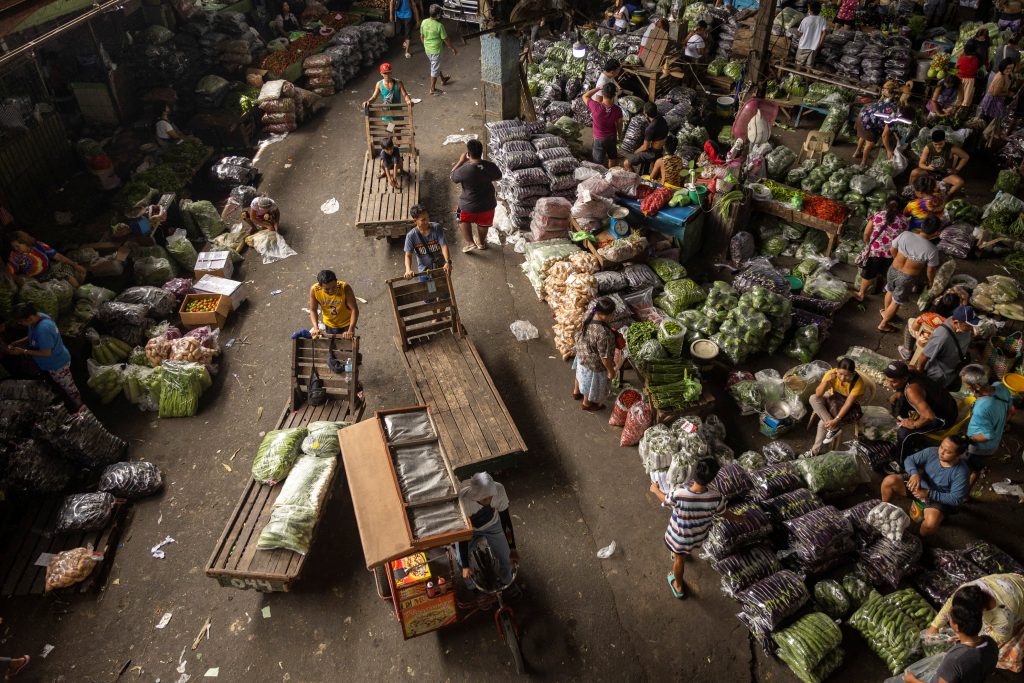In 2023, the Philippines faced economic challenges stemming from global headwinds, largely due to global geopolitical tensions and the ongoing impact of the COVID-19 pandemic. These challenges included inflationary pressures, trade bottlenecks and the Philippine peso’s depreciation against the US dollar.
Despite these obstacles, the Philippine economy demonstrated remarkable resilience. Key indicators included robust domestic demand, a substantial recovery in the labour market and a stable external position backed by strong international currency reserves and manageable external debt. But inflation remained a concern, exceeding the government’s target and prompting a tightening of monetary policy. Price anomalies are likely to have especially impacted the poor. While inflation eased slightly, reaching 4.7 per cent in July 2023, it still exceeded the government’s target of 2–4 per cent.
While the Philippine economy has exhibited remarkable resilience amid the complex and challenging global economic landscape of 2023, other development outcomes have been mixed. National and international assessments indicate the Philippines’ lacklustre performance in achieving the Sustainable Development Goals (SDGs). The Philippine Statistics Authority reported that less than 20 per cent of SDG indicators were on track, with nearly 30 per cent regressing. The Sustainable Development Report ranked the Philippines 98th out of 166 countries with only 34.6 per cent of targets achieved or on track.
To enhance its economic trajectory and socio-economic outcomes, in the short term the Philippines should focus on stimulating domestic demand through physical and human capital development, job creation and an improved social safety net. In the medium term, the Philippines should focus on SDGs related to the environment, gender equality and social inclusion.
Fostering a culture of innovation, digitalisation and entrepreneurship is crucial. A focus on quality education and skills development is also essential to prepare the workforce for evolving labour market demands.
The government’s Philippine Development Plan (PDP) highlights the development of human capital. It stresses innovation and the need to be globally competitive, though it falls short of discussing the role of increased digitalisation.
To address socioeconomic discrepancies in health and education, the government should promote access to adequate healthcare and improve tools for remote learning. Also critical is addressing issues in education such as decongesting the learning experience, improving the implementation of using the country’s diverse languages as the primary medium of instruction, instead of Filipino and English, and improving coordination among regulatory bodies. By learning from high-performing school systems throughout the world, the Philippines can develop a clear strategy to assure quality education and equip the workforce with the skills and knowledge required for the evolving demands of the labour market.
The government should also implement labour and employment strategies to support the achievement of the SDGs. It should create a more extensive labour market information system and integrate green competencies in vocational training and education programs.
Preparing the workforce for artificial intelligence is paramount. This requires a comprehensive approach to education, training and lifelong learning, starting with integrating AI and digital literacy into the curriculum. Fostering a culture of innovation, digitalisation and entrepreneurship will drive the development of new technologies, products and services, leading to increased productivity and economic competitiveness. Enhancing productivity requires a multi-pronged approach that encompasses skills development, the promotion of innovation and regulatory streamlining.
The Philippines has committed to promoting innovation in AI and related technologies. This involves substantial investments in research and development, fostering a supportive ecosystem for companies specialising in AI and encouraging collaboration between the public and private sectors. The Philippines aims to develop tailored AI solutions, attracting foreign investment and establishing itself as an ASEAN hub for technological innovation.
But the crafting of the National Artificial Intelligence Roadmap promoted since 2021 appears to have been delayed. For the Philippines to achieve its goal of being an ‘AI centre of excellence’, the roadmap should be completed — and soon. The plans articulated in this roadmap will need policy support and funding.
The Philippines is poised to embrace the twin transition — a shift towards a greener and more digital future. This shift involves promoting the use of modern agricultural technologies, promoting the adoption of Industry 4.0 technologies, and encouraging businesses to develop green technologies.
The PDP also outlines strategies for communities to adapt to the dual transformation. One strategy is the adoption of green features in housing and community design. Construction companies are also encouraged to develop green architecture and additive manufacturing.
The Philippines aspires to be a regional leader in digital transformation. This involves pioneering innovative digital policies, sharing best practices with neighbouring countries and actively participating in regional initiatives. Through these concerted efforts, the Philippines can set a benchmark for regional digital and ecological transformation. This transition is a critical step towards ensuring sustainable growth, enhancing the nation’s global competitiveness, and improving overall quality of life for citizens in an increasingly digital world.
Engaging in mutually beneficial partnerships with other countries, especially in ASEAN, can open doors to new markets, facilitate access to cutting-edge technologies and attract foreign investment. By pursuing strategic alliances and actively participating in international trade agreements, the Philippines can expand its global reach, diversify its economy, and enhance its competitiveness. The government should act as a partnership broker, keeping business interests aligned with the SDGs.
Targeted socioeconomic policies, investment in human capital and proactive international engagement are key to achieving sustainable growth and a society that embraces innovation, digitalisation, and inclusion.
Francis Quimba is a Research Fellow at the Philippine Institute for Development Studies.
Jose Ramon Albert is a Senior Research Fellow at the Philippine Institute for Development Studies.
This article is part of an EAF special feature series on 2023 in review and the year ahead.

